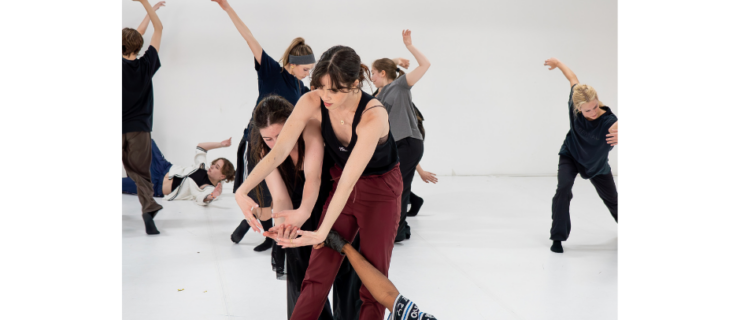Armitage Gone! Dance & Dance Grand Moultrie
SummerStage
Central Park, NYC
July 15–16, 20011
Olivia Bowman-Jackson in Darrell Grand Moultrie’s
The Melting Pot. Photo by Aylin Gucalp, courtesy SummerStage.
Whatever you think of Karole Armitage’s work, she has a bold, distinctive, female voice in dance that cannot be ignored. In her hard-hitting “Quantum,” an excerpt from Three Theories (2010), the women lead the way, flaunting their high extensions, taking defiant stances, and occasionally giving their partners a gentle shove. Rhys Chatham’s taped music pounds the air with irregularly timed crashes, giving a rhythmic force that matches Armitage’s own explosiveness.
The partnering is nothing short of awesome. Once you get over the bikini-clad women’s excessive leg splitting (a crotch-opening kick greets the audience as often as a handshake in civilian life), you can appreciate the amazing choreography. The men support the women, but in between each point of contact, they are free to scrounge, scrunch, lope, or slither in an almost animal fashion. There’s a gender-bending thing going on here—as in much of her work—where the women are strong and the men are sensual. Marlon Taylor-Wiles was particularly astounding at splicing together radically different qualities.
Armitage’s gender play went further in her world premiere, UnEasy. Her eight dancers slouch and slink around the stage, enacting a kind of sex/drugs/rock’n’roll torpor—perhaps influenced by her past work on the musical Hair or by the presence of the rock musicians onstage. A woman would shed a layer of clothing that later got put on by a man. (Costume concept by Doug Fitch).
Vijay Iyer and his three musicians sit upstage, evenly spaced out. When they begin the piece, the focus is on them with only a single dancer so far off to the side that you might not see her. She is Megumi Eda, the only long-term member of the company, who has glamour and technique to burn. She wanders around, sometimes donning a biker’s helmet (when it stays on), and later picking up a parasol. At one point, a man does a seriously queenie solo. It’s all very liberating, but there’s an aimless, dissolute quality to both the music and the dancing. So when three men dance in unison, it’s cause for excitement. Their trio is flamboyant and detailed, and I wished it would go on longer.
It was an interesting choice for SummerStage to pair Armitage with Darrell Grand Moultrie, a Juilliard grad who has not shown work in NYC but often choreographs for ballet companies. This was the debut of his own pick-up company. Like Armitage, he has a diverse group both racially and in mixing styles; both showed pieces where barefoot dancing and pointe work co-existed. His tone is lighter, more exuberant while Armitage’s dances always have a hint of menace.
Moultrie made Regality for the August Wilson Center Dance Ensemble, a group of pre-professinal students from Pittsburgh. He gave each dancer the freedom to be an individual, and they were bursting with energy. What a joy to watch!
His premiere, The Melting Pot, was almost like five separate short dances, each with different costumes and music. But it gave further opportunity to see his unique blend of movements: big moves juxtaposed with small, sensual gestures, and low-to-the-ground second-position pliés. (In his conversation with me in Choreography in Focus, he counts Ohad Naharin among his influences.) The second section, “I Got My Life” (music by Honey Dijon) showcased Olivia Bowman-Jackson, a fierce former Ailey dancer who tore through the witty struts and twists with pizzazz. She was riveting.
Going to see dance at SummerStage is always a pleasant way to spend a summer night—and it’s free. When the program is this good, you can’t believe your luck.




